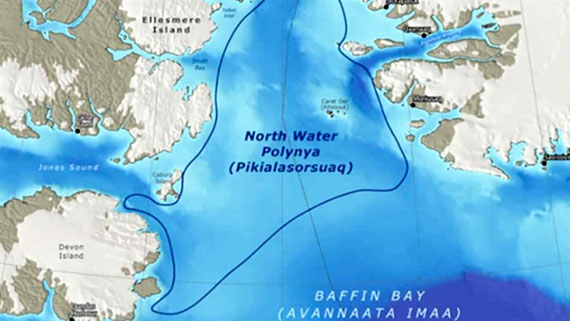Ottawa silent on protecting Arctic’s North Water polynya from toxic space junk
As the European Space Agency launches more rockets into space this year, a group of students in British Columbia are sending out an S.O.S to the world about dangerous leftover rocket fuel falling into Nunavut waters.
But months have passed since they wrote their letter and the Canadian government has not yet replied.
The Northern Waters Initiative, made up of four students from the University of British Columbia, sent letters to dozens of federal agencies, elected officials and non-government organizations arguing that the leftover—and highly toxic—hydrazine fuel from used rocket fuselages falling into waters around Baffin Bay is a violation of international law.

But it’s mostly fallen on deaf ears, even within federal departments that have a mandated interest in the topic such as foreign affairs and fisheries and oceans.
“Since sending our letter we’ve received really lackluster responses from most of the ministries that we sent it out to,” Northern Waters Initiative member, Peter Craigen, told Nunatsiaq News from Vancouver, March 24.
Hydrazine, which is currently used for fuel on old Russian SS-19 rockets, is classified as a highly toxic substance for humans under Canada’s Environmental Protection Act.
Its effects on animals and ecosystems have never been evaluated but each rocket shot from Russia into polar orbit risks depositing the fuel into Nunavut’s North Water polynya, also called Pikialasorsuaq—the most biologically diverse region north of the Arctic Circle and one that many Nunavummiut depend on for subsistence.
According to the ESA’s launch schedule, one or two rockets have been launched above the North Pole from Russia each year for at least the last decade, Craigen said.
Two launches are scheduled for later this year.
Last June, the Inuit Circumpolar Council condemned a rocket launch from Russia that was expected to drop spent rocket stages and fuel into Nunavut waters.
“Inuit live here, Inuit use the animals in these waters to feed our families. This is our home,” ICC’s international chair, Okalik Eegeesiak, said at the time.
“The potential for disaster is very high, as well the people living around the polynya have really no say in the matter,” Craigen said.
“Based on the precautionary principle, if it’s highly toxic to humans, there’s a chance that it could also be highly toxic to marine organisms living in the polynya.”
Craigen, along with schoolmates Cullen McDorman, Nicole Covey and Ella Champion, say the launches are in violation of the United Nations Declaration on the Law of the Sea.
That declaration says that states have the sovereign right to the protection and preservation of natural resources, living or non-living, found in waters within their borders.
Similar protective statutes are found within the Canadian Fisheries Act and the Arctic Waters Pollution Prevention Act.
The Northern Waters Initiatives wants the Government of Canada to conduct a study analyzing if hydrazine will adversely affect the North Water polynya, as well as consult with surrounding Inuit communities.
The Canadian government should also consider imposing a moratorium on the practice of dropping rocket stages into the North Water polynya, their letter states.
But so far, official response from Canada to the letter has come in the form of automated replies, if anything at all.
Two rounds of letters and emails were sent out in December last year and then again in January, Craigen confirmed.
Included on the mailing list are Nunavut Premier Peter Taptuna and independent Nunavut MP, Hunter Tootoo.
Greenpeace Canada, which did respond to the Northern Water Initiative letter, told Nunatsiaq News that the public outcry over the rocket launch last year is a positive step, but they remain disappointed that the practice has gone on for years with little public attention.
“The Canadian government needs to act swiftly to ensure there are proper rules and enforcement in place to make sure no one is releasing hydrazine or any other hazardous substances into Arctic waters,” said Alex Speers-Roesch from Greenpeace Canada.
“The Arctic should not be a dumping ground for anyone’s toxic waste.”